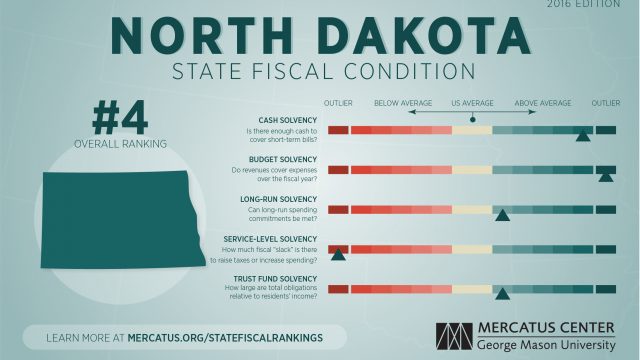North Dakota Falls In Fiscal Health Rankings, But Still Comes In At Fourth In Nation

The outlook on North Dakota’s budget situation is a headline issue in the state right now. Obviously people are worried about how spending reductions will impact their jobs and lives. And, politically speaking, the issue has become central to the NDGOP gubernatorial primary between Attorney General Wayne Stenehjem and Fargo businessman Doug Burgum which, in this deeply Republican state, is really more relevant than the general election.
Stenehjem has said that while the state’s budget situation is serious, it’s also something the state is well prepared for. North Dakota’s is an economy dominated by the production of commodities, after all, and so we’re not exactly strangers to the vagaries of commodity markets.
Burgum, on the other hand, argues that the state’s current fiscal situation was created by mismanagement – “runaway spending” as he has put it in his campaign messaging – and that we need fundamental changes to the way North Dakota does business.
[mks_pullquote align=”right” width=”300″ size=”24″ bg_color=”#ffffff” txt_color=”#000000″]”North Dakota ranks 4th in the newest edition of the Mercatus Center at George Mason University’s annual fiscal health rankings, falling 2 spots from last year,” a release from the organization states. “The rankings, part of the first and most in-depth academic study of its kind, use states’ most recent financial reports to determine where they stand on five critical issues.”[/mks_pullquote]
Into that debate comes a report from the highly respected Mercatus Center at George Mason University which indicates that, while North Dakota has fallen in their rankings, the state still has the fourth best fiscal condition in the nation.
“North Dakota ranks 4th in the newest edition of the Mercatus Center at George Mason University’s annual fiscal health rankings, falling 2 spots from last year,” a release from the organization states. “The rankings, part of the first and most in-depth academic study of its kind, use states’ most recent financial reports to determine where they stand on five critical issues.”
You can see North Dakota’s specific rankings in the image above. Study author Eileen Norcross notes that North Dakota’s kept a high ranking despite a huge drop in revenues from energy development.
“North Dakota reported revenues of $10.5 billion, an increase of 15 percent since FY 2013, and expenses of $7.4 billion,” she said in the group’s release. “On a cash-solvency basis, the state has between 4.97 and 7.17 times the cash on hand to cover short-term liabilities. Looking ahead to FY 2015 shows that total revenues fell to $5.6 billion, the result of a large drop in oil, gas, and coal revenues.”
Again, this seems to back up what Stenehjem has been saying, which is that while North Dakota is weathering a downturn in energy and agriculture commodity prices, the state was prepared for it with ample fiscal reserves. The only area where the state got a low grade was in “Service Level Solvency,” which is basically the state’s capacity to increase spending should the public demand it.
Right now North Dakota has almost no capacity for increasing spending, due to dropping revenues and a mandate for a balanced budget in the state constitution. But then I think criticism of spending is an area Burgum gets right.
North Dakota’s leaders were far too aggressive with the spending increases during the oil boom years, and that the current fiscal situation would be easier to handle had they not gotten carried away.
UPDATE: Mike Nowatzki flags an important point about this data in his report:
Since the data was from fiscal year 2014, “it appears as though these states are very well off, but declining oil prices and the budget crises that are currently unfolding in Alaska and other oil-producing states highlight the danger of expanding revenue based on volatile revenue sources,” the summary states.
Still, a big part of the make up of the state’s fiscal health is its reserves, and that hasn’t changed even though revenues have fallen.
[scribd id=314488639 key=key-L2Na1Hx8o085o3NkhFlF mode=scroll]




